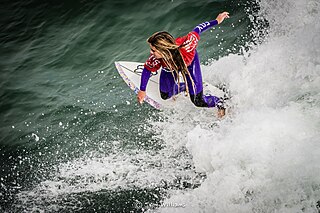
Action sports, adventure sports or extreme sports are activities perceived as involving a high degree of risk of injury or death. These activities often involve speed, height, a high level of physical exertion and highly specialized gear. Extreme tourism overlaps with extreme sport. The two share the same main attraction, "adrenaline rush" caused by an element of risk, and differ mostly in the degree of engagement and professionalism.
Hubris, or less frequently hybris, describes a personality quality of extreme or excessive pride or dangerous overconfidence and complacency, often in combination with arrogance. The term arrogance comes from the Latin adrogare, meaning "to feel that one has a right to demand certain attitudes and behaviors from other people". To arrogate means "to claim or seize without justification... To make undue claims to having", or "to claim or seize without right... to ascribe or attribute without reason". The term pretension is also associated with the term hubris, but is not synonymous with it.

Fun is defined by the Oxford English Dictionary as "light-hearted pleasure, enjoyment, or amusement; boisterous joviality or merrymaking; entertainment".
A shill, also called a plant or a stooge, is a person who publicly helps or gives credibility to a person or organization without disclosing that they have a close relationship with said person or organization, or have been paid to do so. Shills can carry out their operations in the areas of media, journalism, marketing, politics, sports, confidence games, cryptocurrency, or other business areas. A shill may also act to discredit opponents or critics of the person or organization in which they have a vested interest.
Dude is American slang for an individual, typically male. From the 1870s to the 1960s, dude primarily meant a male person who dressed in an extremely fashionable manner or a conspicuous citified person who was visiting a rural location, a "city slicker". In the 1960s, dude evolved to mean any male person, a meaning that slipped into mainstream American slang in the 1970s. Current slang retains at least some use of all three of these common meanings.
An anodyne is a drug used to lessen pain through reducing the sensitivity of the brain or nervous system. The term was common in medicine before the 20th century, but such drugs are now more often known as analgesics or painkillers.

A tarpaulin or tarp is a large sheet of strong, flexible, water-resistant or waterproof material, often cloth such as canvas or polyester coated with polyurethane, or made of plastics such as polyethylene. Tarpaulins often have reinforced grommets at the corners and along the sides to form attachment points for rope, allowing them to be tied down or suspended.

The shaka sign, sometimes known as "hang loose" is a gesture with friendly intent often associated with Hawaii and surf culture. It consists of extending the thumb and smallest finger while holding the three middle fingers curled, and gesturing in salutation while presenting the front or back of the hand; the wrist may be rotated back and forth for emphasis. The shaka sign is similar to the letter Y in the American manual alphabet in American Sign Language or the sign for number six in the Chinese hand counting symbol. The shaka sign should not be confused with the sign of the horns, where the index and pinky fingers are extended and the thumb holds down the middle two fingers.
"hang ten" is a nickname for any of several maneuvers used in sports, especially surfing, wherein all ten toes or fingers are used to accomplish the maneuver.

Surf culture includes the people, language, fashion, and lifestyle surrounding the sport of surfing. The history of surfing began with the ancient Polynesians. That initial culture directly influenced modern surfing, which began to flourish and evolve in the early 20th century, with its popularity peaking during the 1950s and 1960s. It has affected music, fashion, literature, film, art, and youth jargon in popular culture. The number of surfers throughout the world continues to increase as the culture spreads.
Jeff Clark is one of the most noteworthy big-wave surfers, famous for surfing Mavericks alone for 15 years before it was widely discovered by the big-wave surfing community.

Fashion of the 1960s featured a number of diverse trends, as part of a decade that broke many fashion traditions, adopted new cultures, and launched a new age of social movements. Around the middle of the decade, fashions arising from small pockets of young people in a few urban centers received large amounts of media publicity, and began to heavily influence both the haute couture of elite designers and the mass-market manufacturers. Examples include the mini skirt, culottes, go-go boots, and more experimental fashions, less often seen on the street, such as curved PVC dresses and other PVC clothes.
In the lineal kinship system used in the English-speaking world, a niece or nephew is a child of an individual's sibling or sibling-in-law. A niece is female and a nephew is male, and they would call their parents' siblings aunt or uncle. The gender-neutral term nibling has been used in place of the common terms, especially in specialist literature.

This glossary of surfing includes some of the extensive vocabulary used to describe various aspects of the sport of surfing as described in literature on the subject.[a][b] In some cases terms have spread to a wider cultural use. These terms were originally coined by people who were directly involved in the sport of surfing.

Surfer hair is a tousled type of hairstyle, popularized by surfers from the 1950s onwards, traditionally long, thick and naturally bleached from high exposure to the sun and salt water of the sea. In the late 1960s and 1970s, the long hair and general lack of personal grooming was closely associated with hippie culture. Today, hairstyling companies brand their own hair gels, shampoos and hair wax to achieve the "surfer look" with hairstyles that are often shorter than traditionally, which often require more grooming to achieve the permanent hair lift or intentional windswept look. Amongst women, fashion magazines have referred to "sun streaked surfer hair" as a desirable look for women, although genuine surfer hair is often heavily damaged by the elements.

Point Break is a 2015 action-thriller film directed and shot by Ericson Core and written by Kurt Wimmer. He co-produced it with John Baldecchi, Broderick Johnson, Andrew A. Kosove, Christopher Taylor and David Valdes.

Bro culture is a subculture of young people who spend time partying with others like themselves. Although the original image of the bro lifestyle is associated with sports apparel and fraternities, it lacks a consistent definition. Most aspects vary regionally, such as in California, where it overlaps with surf culture. Oxford Dictionaries have noted that bros frequently self-identify with neologisms containing the word "bro" as a prefix or suffix.
Matt Warshaw is a former professional surfer, former writer and editor at Surfer magazine (1984-1990), and the author of dozens of feature articles and large-format books on surfing culture and history.

Caroline Marks is an American professional surfer. She is the 2023 World Surf League Women's World Tour Champion and an Olympic gold medalist at the 2024 Paris Olympics. She has won multiple national championships and is the youngest woman to compete in a World Surf League event. Marks is the youngest surfer to qualify for the women’s Championship Tour.











